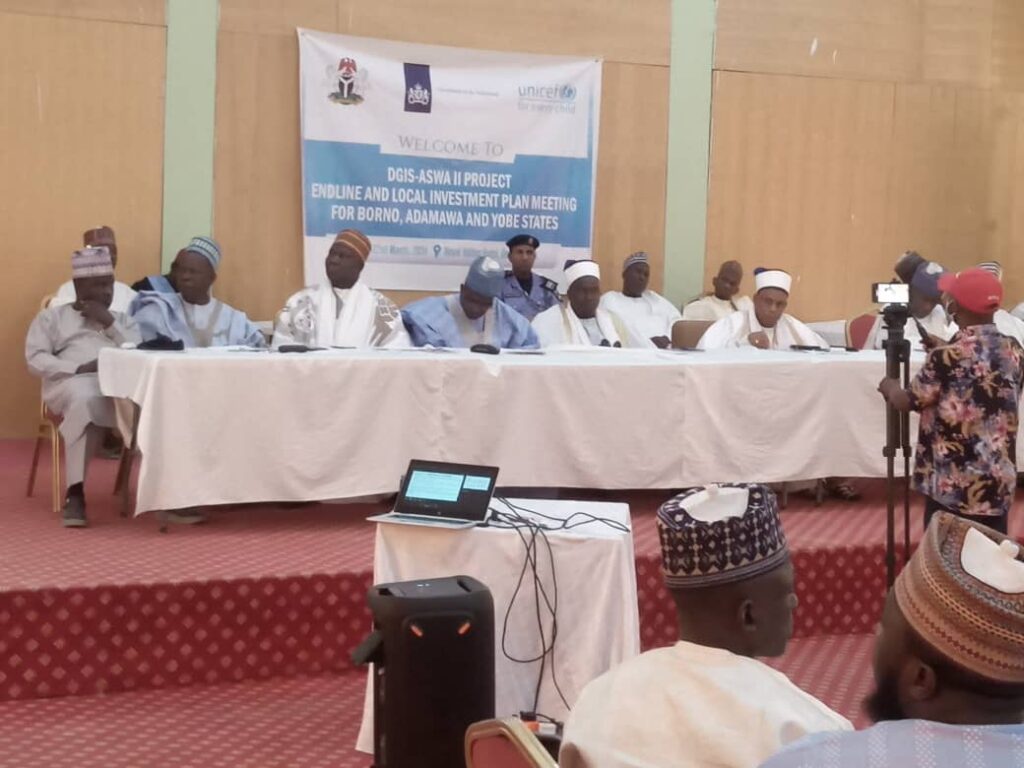By Laraba Usman
The Federal Government of Nigeria and United Nations Children Fund (UNICEF) supported by the Netherlands Government has provided safe drinking water to no fewer than 997,000 persons in Adamawa, Borno and Yobe states.
Mr.Jonathan Ekhato UNICEF Water Sanitation and Hygiene Specialist stated this in his presentation at the Directorate General for International Cooperation (DGIS)-Acceleration to Sanitation and Water for All (ASWA) II programme Edline and Local Plan meeting held in Gombe.
While highlighting the achievements recorded in six Local Government Areas of Adamawa,Borno and Yobe states, Ekhato said the intervention had yielded positive outcome.
Our correspondent reports that the benefitting LGAs were Guyuk, Jada in Adamawa; Magumeri, Biu in Borno and Geidam and Fune in Yobe State.
Also, DGIS-ASWA is a UNICEF programne that aims to improve the health, nutrition, and well-being of vulnerable people, especially women and girls in rural areas.
The WASH specialist said over 880,000 individuals across the local government areas have stopped open defecation practices and adopted the use of safe and hygienic toilet facilities.
According to him, Biu, Guyuk, and Jada were declared open defecation-free by the National Task Group (NTGS), which has played a vital role in reducing outbreak of waterborne disease.
He said the programme facilitated the construction of 500 new water facilities and the rehabilitation of 1,000 broken-down facilities and 54 schools and 38 healthcare facilities received basic water, sanitation, and hygiene services.
Also speaking, Dr. Nicholas Dumebi Director Water Resources Federal Ministry of Water Resources emphasised the need for sustainability plan, recalling the effort of Federal Government to the sustainability of the achievement made.
Represented by Mr.Ogbonna Kenbeth staff of the Ministry said sustainability remained a big issue in Nigeria” 46 per cent of WASH facilities are unsustainable .
“When we started the programme in 2019, there was a sustainability plan that was developed like an agreement to sustain the facilities.
“And today we are developing a sustainability action plan to leverage on that because in Nigeria sustainability is a big issue,” he said.
UNICEF WASH Manager, Chiranjibi Tiwari, emphasized the importance of water accessibility, stressing the need for sustainability and local investment plans to ensure continued benefits for communities long after the programme’s conclusion.
He added that the ministry’s partnership with UNICEF was to improve livelihoods across Nigeria and called for sustainability of the project.
Also speaking, Alhaji Hamza Buba Emir of Jajete in Yobe State lauded the project ,adding that it was a great achievement for all the benefitting LGAs ,states, and the country in general.
He said the availability of clean water would improve their lives and well-being.

